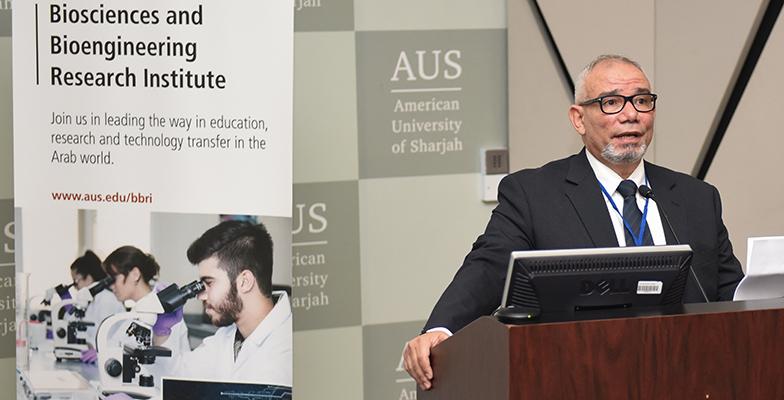- About
- Admissions
- Study at AUS
- Prospective Students
- Bachelor's Degrees
- Master's Degrees
- Doctoral Degrees
- Admission Publications
- International Students
- Contact Admissions
- Grants and Scholarships
- Sponsorship Liaison Services
- Testing Center
- New Student Guide
- File Completion
- New Student Orientation
- Payment Guide
- Executive Education
- Students with Disabilities
- Academics
- Life at AUS
- Research
- Contact Us
- Apply Now
- .

Biosciences and bioengineering symposium discusses latest research in medicine and technology
The first AUS Symposium on Biosciences and Bioengineering focusing on the latest technologies in medicine concluded its activities yesterday, February 24, at American University of Sharjah (AUS).
The two-day event, which drew experts and academics from around the world, was organized by the university’s Biosciences and Bioengineering Research Institute (BBRI). It highlighted the latest research and advancements in cardiovascular diseases and diabetes; cancer; nervous system diseases; artificial intelligence in medicine; halophytes, algae and biofuels; genomics; bioinformatics; computational biology; and healthcare technology innovation, management and transfer.
Speaking about the event, Dr. Hassan Al-Nashash, Professor of Electrical Engineering and Interim Director of BBRI, said:
“This symposium is one of BBRI’s activities that aim to provide participants, including students, with an opportunity to convene and present their work and learn about the latest in the fields of biosciences and bioengineering. It is also an excellent opportunity for networking and exchange of expertise.”
“In September 2017, the UAE government launched the UAE Strategy for the Fourth Industrial Revolution which focuses on innovative education, artificial intelligence, intelligent genomic medicine and robotic healthcare. Our mission in the BBRI is in line with this strategy as it aims to prepare professionals with a graduate-level education infused with skills to become job creators and entrepreneurs. This is in addition to generating and disseminating scientific knowledge and innovation that aim to improve the quality of life in the GCC region.”
The symposium was attended by professional engineers, scientists, clinicians and academics engaged in research and development in biosciences and bioengineering. The event also featured six guest keynote speakers and 19 others from various institutions and organizations such as the Institute of Cancer Research in the UK; the University Hospital in Sharjah; Singularity University Dubai Chapter; Singapore Institute for Neurotechnology; Aalborg University Esbjerg in Denmark; and Beijing Genomics Institute (BGI) in China among many others.
The symposium is planned to be held on a biannual basis.

